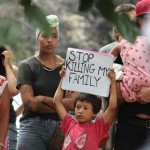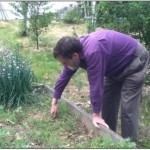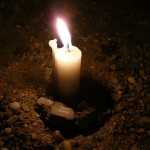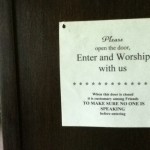The annual Sessions of New England Yearly Meeting this year was unusual. The 350th anniversary of NEYM was declared a Jubilee year, and items of business were squeezed into very brief discussions or simply handed down from the clerks’ table in a “unity agenda” for approval without discussion, leaving the bulk of our time together free for “meetings to hear God’s call.”
The week ended with the drafting of a Minute of Sending Forth, which was an attempt to capture succinctly all of the currents of discernment and passion, despair and hope, which had been rising during the week. The minute included a brief statement that had been composed by one of the anchor groups—small groups of a dozen or so that had been meeting in between the gatherings of the entire body. This small, three-paragraph statement proved to be very controversial. It was prefaced with “noting that we as a body cannot claim all these words as our own” and followed by “with pain and regret and gratitude for their faithfulness … we record that [half a dozen] Friends wish to stand aside from this minute.”
The controversy arose from the opening two sentences of the anchor group statement: “There is only one testimony, and it is the testimony to the transforming power of God. There is only one witness and it is the witness of the body of Christ.” In the context of a liberal Quaker body that included both Christ-centered and non-Christian Friends, it seemed wildly inappropriate to conclude our annual Sessions with a declaration that seemed to say that everyone in the room was Christian and that Christianity is the only true religion.
The clerks would not permit any wordsmithing in the language of the anchor group’s statement, and there was no time, at the end of the week, to compose a statement of our own that would reflect the leadings of the entire body. Their statement was simply cut-and-pasted in, making it look as if it were ours. The minute as adopted was especially painful because it came so close to capturing the essential truth: that we really are one body with one witness, and that in worshiping together, we really are all gathered under one Spirit.
Some Friends angrily stood aside. Enough others were so uneasy that the Minute of Sending Forth ended up saying more about our disunity than about our unity. Me…I kind of shrugged with a feeling of, Oh well, we blew it that time. We’ll do better in the future.
Months passed. Then, a couple of weeks ago, a f/Friend from the Boston area, who had also been at Sessions, was in town and stopped by to have dinner and spend the evening in conversation. Like me, he has a painful history with Fundamentalist Christianity. Like me, he has an appreciation for the universalism and diversity of liberal Friends. And as we were talking about the Minute of Sending Forth and about the anchor group statement, he said two things that got me thinking.
One was that Quakers (at least liberal Quakers) in using phrases like “only one witness and it is the witness of the body of Christ,” mean something very different than Southern Baptists would mean with the same phrase, and he was disappointed that people at Sessions had been unable to trust that the anchor group had been using the phrase in the Quaker sense.
The other was that he was disappointed that those first two sentences were the only part of the anchor group statement that anyone ever talked about. So much of worth later on in the statement was being ignored or completely missed.
Thinking about this, I realized I couldn’t remember a single word of the statement except for those first two sentences. The conversation that night led me to go back and look at it again, first transcribing it into my Lectio Divina notebook and then simply rereading it and sitting with it.
There is only one testimony, and it is the testimony to the transforming power of God. There is only one witness and it is the witness of the body of Christ. There are many pieces of work which will require the particular gifts, ministries, and passions of all of us, because the desire of God for healing and redemption of this blessed creation requires profound change.
We refute the lies of the present situation: the lie that causes movements for transformation to see each other as competitors; the lie that says that social action is spiritually shallow and spirituality is socially passive; the lie that says that war and destruction are inevitable and efforts for change are hopeless; the lie that says we can’t change the world until we have perfected ourselves.
We declare that with God’s help, we stand ready to be agents of transformatory witness to God’s promise. We pray for the wisdom to perceive the patterns of thought and behavior within ourselves which conform to the present darkness. We pray for the strength to take bold, prophetic and concrete action in the world. Some of that action will be local, some global, some individual, some corporate, some immediate, some long-term. For action which is rightly guided, we can trust that we have already the resources required for faithfulness. Use us Lord!
My first reaction to those opening sentences was to simply skip over them. (In fact, it was suggested on the floor of Sessions that the statement be included with the first two sentences removed—a suggestion that was summarily dismissed by the clerks’ table.)
I remember once hearing a Chinese physicist talk about how incredibly difficult it was to write a basic physics textbook in communist China, not because the physics was difficult, but because “you had to have Mao on every page.”
I remember in the weeks and months following 9/11, how antiwar activists wore red, white, and blue and used slogans like “Peace is patriotic,” not because patriotism was forefront on their minds just then, but because you simply couldn’t participate in the conversation about war and peace without first establishing that you loved America.
And I think about how Quakerism came into being in a time of religious wars and religious terrorism. Like patriotism after 9/11, Christianity in the 1600’s was simply a prerequisite to participating in the conversation. Religious freedom, freedom of conscience…these concepts might or might not apply to Puritans or Catholics or Dissenters, but to extend them to Jews or other unbelievers was unthinkable, much the way it was unthinkable for Americans in 2002 to identify with the struggles of Muslim societies to maintain their cultural and religious identities in the face of western globalization.
So my instinct, on trying to read the anchor group statement with an open mind, was to skip over Chairman Mao and go straight to the physics, so to speak.
It took a long time before I saw the elegant parallel structure within the statement. It begins by talking about spiritual/religious unity, and then it uses that to affirm the underlying unity in our various gifts, leadings, and actions. The first two sentences are not just a perfunctory acknowledgement of an obligatory creed. They matter, and if you can avoid choking on the word “Christ”—take the word to mean “Spirit-as-they-perceive-it”—then it is a beautiful and powerful statement.
For me, the parallel structure shows up better (and I am less likely to have a gag reflex to the Christocentrism) if the sentences and some of the clauses are simply reversed in order:
Use us Lord!
We can trust that we have already the resources required for faithfulness in action which is rightly guided. Some of that action will be local, some global, some individual, some corporate, some immediate, some long-term. We pray for the strength to take bold, prophetic and concrete action in the world. We pray for the wisdom to perceive the patterns of thought and behavior within ourselves which conform to the present darkness. We declare that with God’s help, we stand ready to be agents of transformatory witness to God’s promise.
We refute the lies of the present situation: the lie that says we can’t change the world until we have perfected ourselves; the lie that says that war and destruction are inevitable and efforts for change are hopeless; the lie that says that social action is spiritually shallow and spirituality is socially passive; the lie that causes movements for transformation to see each other as competitors.
There are many pieces of work which will require the particular gifts, ministries, and passions of all of us, because the desire of God for healing and redemption of this blessed creation requires profound change. There is only one witness and it is the witness of the body of Christ. There is only one testimony, and it is the testimony to the transforming power of God.
The anchor group seems to have been entirely faithful to their leadings in every word of their statement. But I cannot believe that they ever intended it to speak, as written, for the entire gathered body. If they had so intended, I think they would have had the discernment to use the word “Spirit” instead of “Christ,” knowing (as they surely must have) that the Spirit that covers us and gathers us together in worship is known by some of us as Christ and by others of us by other names, or by no name at all.















